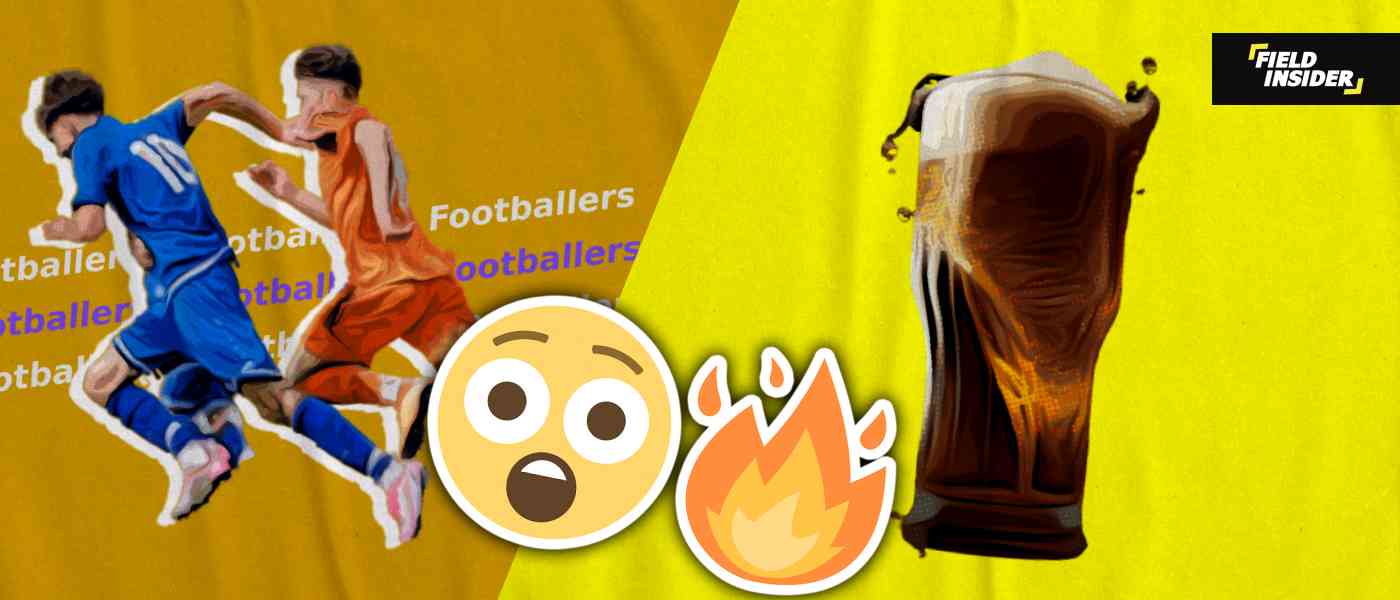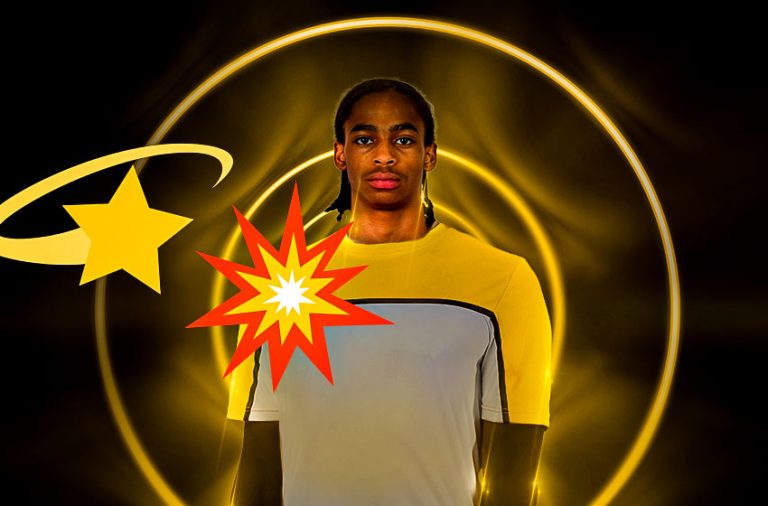What Is The Effect Of Alcohol In Football Players? Full Analysis
The glorification of football players as modern-day gladiators often overshadows the critical aspects of their off-field lives, particularly their personal habits and lifestyle choices.
Among these, alcohol consumption emerges as a significant factor with far-reaching implications on their careers and lives. The relationship between professional athletes and alcohol is complex and multifaceted.
On one hand, alcohol is a common aspect of social celebrations and gatherings; on the other, it poses substantial risks, especially for individuals whose careers depend heavily on physical fitness and mental alertness.
This dichotomy is particularly pronounced in football, where the smallest margin can separate victory from defeat, and peak performance is non-negotiable.
Key Takeaways
| Alcohol Intake | Effect of Alcohol on Football Players |
|---|---|
| Short-Term Impact | Impairs coordination, decision-making, and balance |
| Risk of Injury | Increases significantly |
| Dehydration & Fatigue | Enhances dehydration and fatigue levels during games |
| Muscle Recovery | Hinders recovery and muscle growth |
| Chronic Health Issues | Potential for liver damage and other health concerns |
| Career Threats | Misconduct linked to alcohol can be detrimental to a player’s reputation and career longevity |
What Are The Rules Of Football Leagues And Clubs On Alcohol?
Football leagues around the world, from European to other global leagues, have their distinct regulations set by their governing bodies regarding player conduct and substance use before matches and during the season.
Nonetheless, it is primarily the clubs themselves that have to enforce their own policies for alcohol consumption by players.
These rules are designed to maintain the players’ optimal physical and mental condition throughout the year, and their tenure with the club.
Alcohol and its Effects
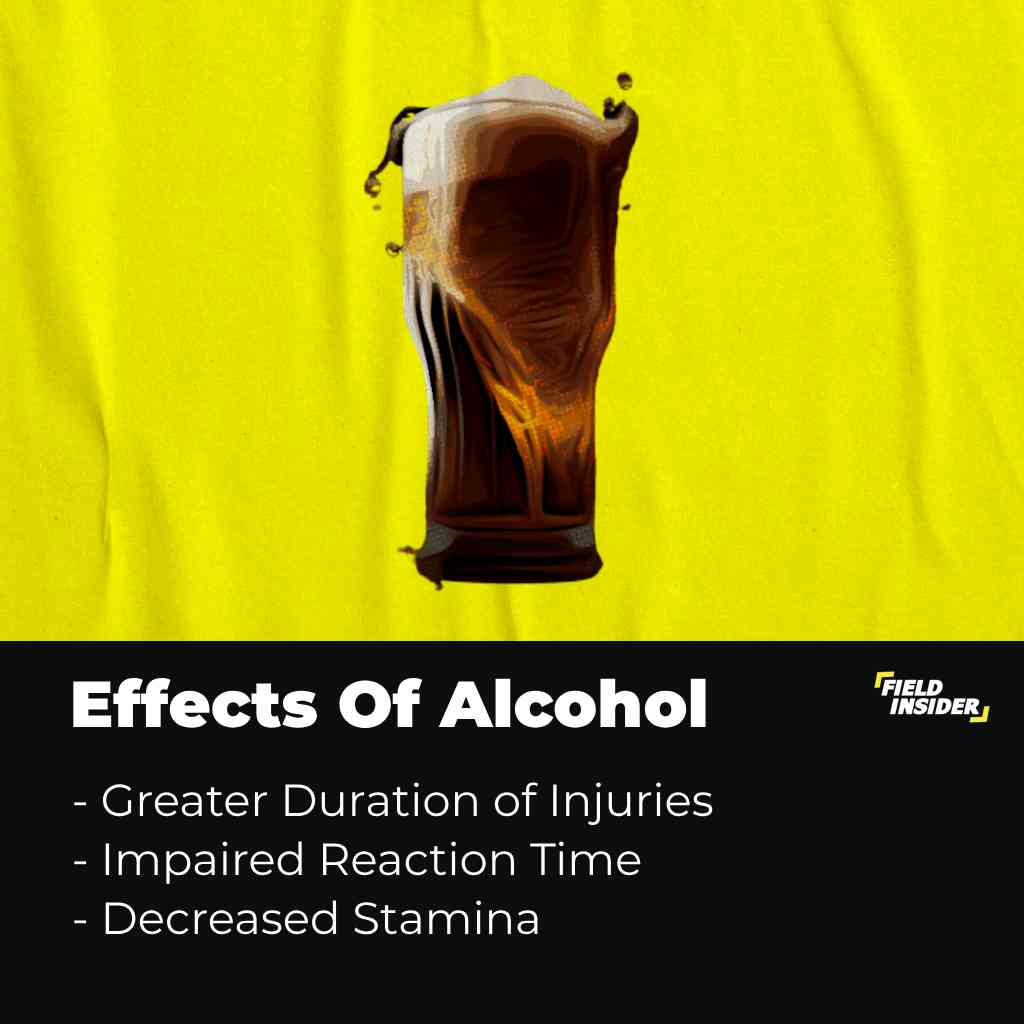
There is no need to describe the general effects of alcohol on the human body. But how those effects translate for footballers is an interesting aspect to explore.
The active ingredient of alcohol is ethanol. Which can have a plethora of negative effects on the human body. Some of theses effects of alcohol are magnified in athletes;
1. Greater Duration of Injuries
Injuries are part and parcel of the game. So recovery is a pivotal part of a season. Where players regularly get injured and have to work on their bodies to recover as soon as possible.
The effect of alcohol on football injuries is such that it delays the recovery process and the duration of injuries.
This is possible because alcohol weakens and shrinks blood vessels. It allows a more significant amount of blood to reach the injured area, causing more significant bleeding and swelling.
Add to that its effect on aerobic performance, and it can also potentially aggregate the chances of getting an injury.
Also, alcohol may be considered a way to sleep more quickly. Still, it can interfere with sleep cycles. Making it difficult for the body to initiate the self-repairing mechanism it usually performs during sleep time.
2. Reduced Vitamin and Mineral Absorption
Our body is not designed to process or store alcohol efficiently. So whenever excessive alcohol enters our body, it finds it tough to eliminate it.
The liver becomes dedicated to eliminating alcohol, and the ability of the liver to process vitamins and minerals decreases.
One vitamin deficiency (thiamine), called Beri Beri is linked explicitly to increased long-term alcohol intake. And remains a major risk with chronic alcohol abuse.
Every vitamin and mineral is important, not just for the athlete but for any normal person too. So long-term use of alcohol in football can manifest itself as deficiencies of these vital chemicals.
3. Impaired Reaction Time
Alcohol is known to impair reaction time to different stimuli. This can be incredibly noticeable on the football pitch where every second matters.
Every single tackle is contested, and when players are consistently late to make 50-50 tackles or cannot make the decisive pass quickly the team is bound to suffer.
A delay in reaction time due to the use of alcohol in football can be of considerable harm on the highest level, while it may not be that noticeable for amateurs.
This change is, of course, dose-dependent and would be more pronounced with higher intake, with obvious manifestations such as balance difficulty, accuracy, and motor skills getting affected due to alcohol.
4. Decreased Stamina
Stamina is a vital feature of any modern player. The consequences of stamina when you use alcohol before football games are detrimental.
What happens is that your body uses liver stores of glucose to power cells once the blood sugar runs out after several minutes of intense physical activity.
When a player binge drinks the night before the game, the liver is busy removing the excess alcohol from the body. It does not release enough glucose to help with football, so another effect of alcohol in football is reduced stamina during prolonged physical activity.
5. Dehydration Effect
Ethanol is a natural diuretic that (increases urine) like tea or coffee. So it naturally has a dehydrating effect. When you add to that the exertion while playing football, the sweating increases the level of dehydration experienced by players.
Dehydration is a significant problem in itself and can lead to several impairments that can interfere with the performance of football players who have a little too much to drink.
This includes excess body heating as alcohol deranges the body’s ability to regulate extreme temperatures due to the decreased cooling effect of water.
6. Weight Gain
Any footballer trying to lose weight is instructed to stay off alcohol. On the contrary, many players are out of shape as the new season starts due to binge drinking in the off-season.
Alcohol has a profound weight-gaining effect. This is because of the higher sugar quantity in them, which gets converted to fat as the body is not able to burn it off with activity.
As a poor source of carbs, alcohol is loaded with them, but the carbs are not able to reach your muscles where you need them the most.
Alcohol also promotes bouts of eating, and so many people on a diet tend to have extravagant meals under the influence of alcohol. A possible reason for this could be the dehydration produced by alcohol in football players, which may be perceived as hunger.
So alcohol in footballers can be a significant cause of weight gain which is understandably harmful to overall performance and sharpness, as seen in the case of Eden Hazard at Real Madrid.
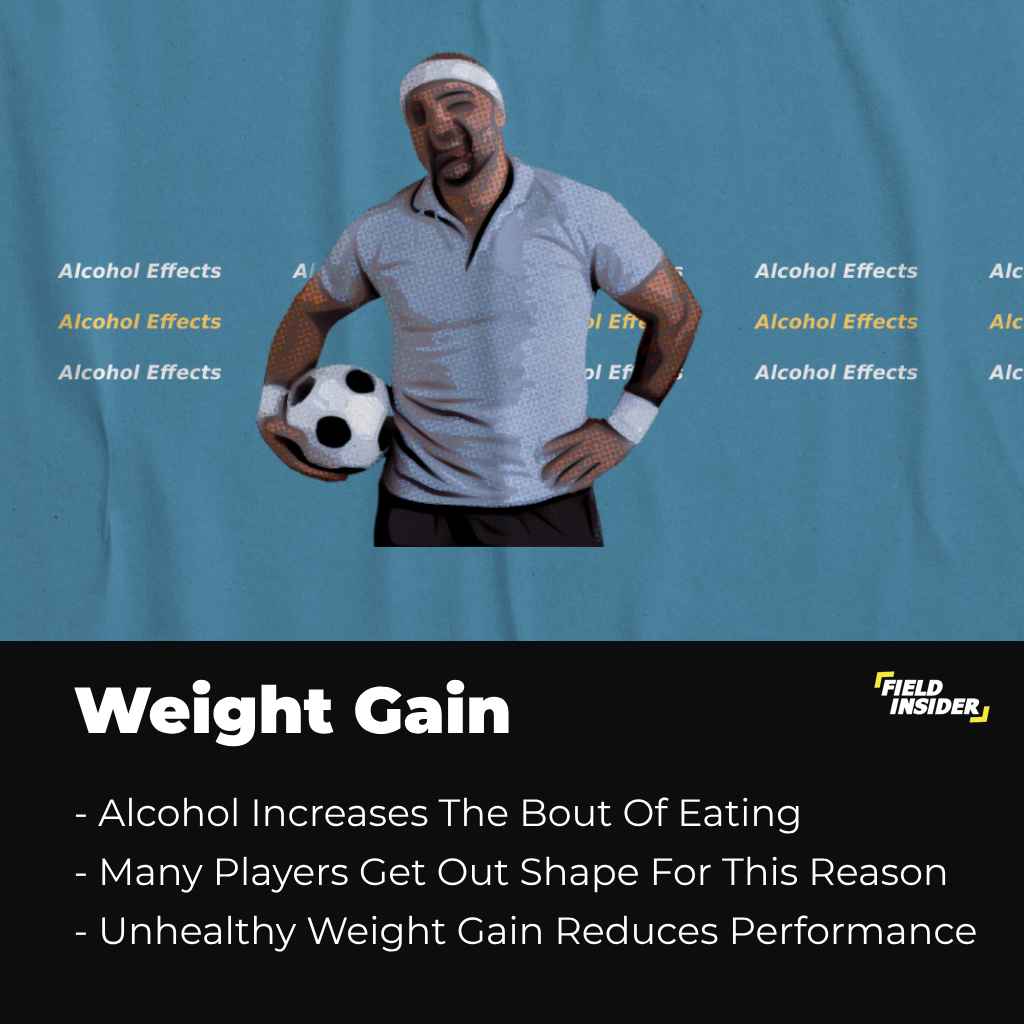
Research and Analysis
A study released in 2022 researched the relationship between alcohol intake and the hazard ratio among different age groups.
The Ueda P, Pasternak B, Svanström H, Lim CE, Neovius M, Forssblad M, Ludvigsson JF, Kader M. Alcohol related disorders among elite male football players in Sweden: nationwide cohort study tracked the incidence of alcohol-related disorders in football players and the general male population up to December 31, 2020.
During the research, 4.3% of football players and 6.3% of men from the general population were diagnosed with alcohol-related disorders. After adjusting for age, residence, and time, football players had a lower risk (hazard ratio of 0.71).
From age <35 to age 44 (which is the max age range of retirement for football players), the risk of alcohol-related disorders is at its lowest. However, as age increases, so does the risk.
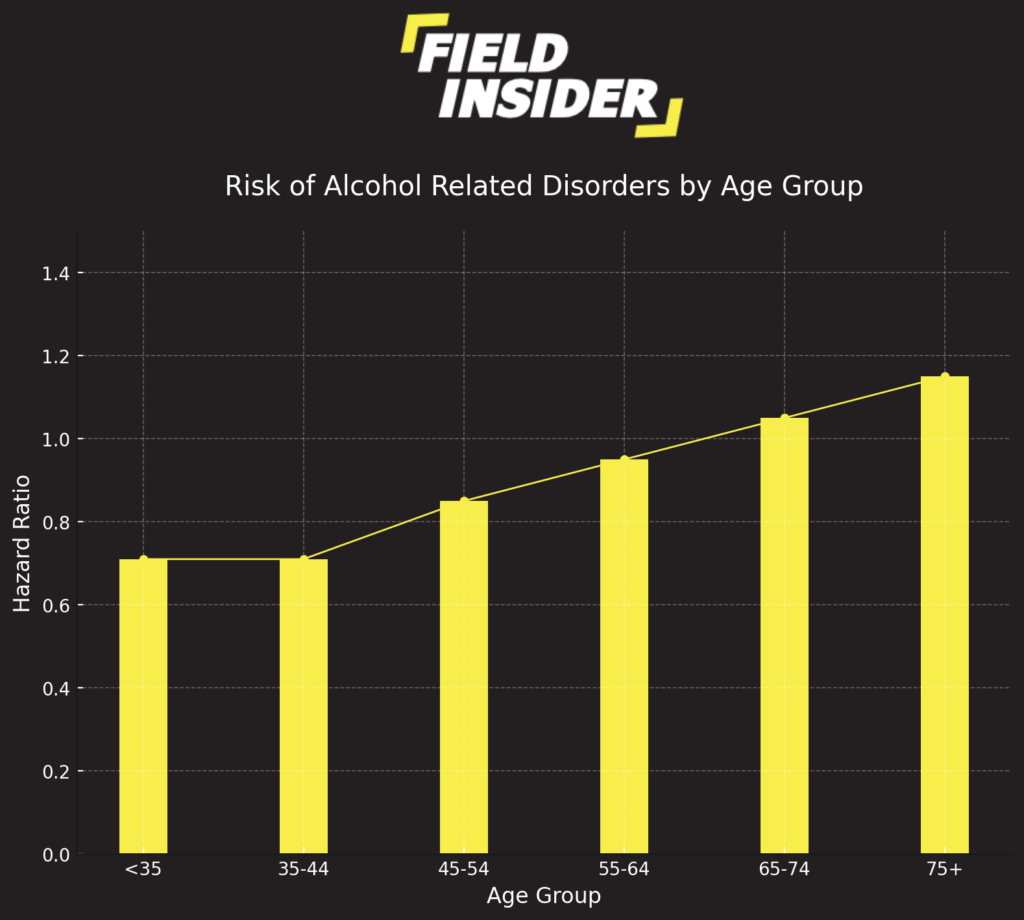
Alcohol and Recovery
In terms of the recovery from the effects of alcohol and recovery after the game, there is increasing evidence that chronic alcohol intake delays recovery and causes considerable muscle damage.
Alcohol recovery is a process that takes time and effort. Remember, it is not only the mental recovery we are talking about here but also the recovery of physical dependency on the substance.
After a certain time, our bodies become accustomed to receiving a particular substance over and over again. Now, when we keep it from getting that substance, it will start showing withdrawal symptoms.
The withdrawal symptoms for a chronic alcohol user can include tremors, shakiness, increased heart rate, anxiety, sweating, vomiting, etc.
This is probably one of the reasons why it is advised to start by cutting the amount of alcohol intake first, rather than going all in.
Can Football Players Consume Alcohol?
Despite the numerous warnings concerning the detrimental effects of alcohol, it undeniably continues to be an integral aspect of life.
In the world of football, alcohol is deeply ingrained in the culture. Examples include Carlsberg’s association with Liverpool, Heineken’s sponsorship of the Champions League, and Budweiser’s presence as a sponsor for both the Premier League and La Liga.
Football and alcoholic beverages have a long history of being intertwined. For professional players, alcohol can serve as a means to relax and temporarily divert their attention from their daily pressures.
It acts as a depressant on the nervous system, offering a soothing effect. Additionally, the euphoric sensations it can induce make alcohol, particularly champagne, a customary part of trophy celebrations in football.
Some teams even employ alcohol as a tool for bonding and enhancing team cohesion, exemplified by Bayern Munich’s Oktoberfest tradition. Nevertheless, it’s important to acknowledge that there are alternative methods for achieving team unity.
In conclusion, alcohol continues to play a role in the lives of football players. A pragmatic approach involves individuals who are accustomed to its presence managing their consumption, while others should exercise caution to prevent it from becoming a habit.
What Is Recommended?
Regarding the recommended maximum alcohol intake in the UK, it continues to be approximately two drinks per day for men and one drink per day for women.
It’s common knowledge that alcohol consumption on match days is deemed unacceptable, and drinking the night before a game is disapproved of due to the negative effects mentioned earlier.
For players who wish to consume alcohol, the key is moderation. They have only a few days available in their busy schedules, and on those occasions, they can choose to relax and enjoy some drinks if they so desire.
On the professional level, many coaches disdain alcohol in football, and some, like Arsene Wenger, even enforced a fine on habitual drinkers.
Indeed, the disadvantages of alcohol in football outweigh its benefits. Given the extensive scientific knowledge that underlies every action a modern footballer takes, refraining from alcohol consumption appears to be an essential step towards achieving success in the beautiful game.
What Do Football Players Take During Matches?

Football (soccer) games tend to last for long periods, and players are mostly active throughout their time on the field. For this reason, they tend to lose a lot of body fluids and burn energy along the way.
In order to keep the body running and prevent breakdown, they tend to take drinks such as water, sports energy drinks, sugary beverages, coffee, and even tea. These help to keep them hydrated and prevent the body from breaking down during a match.
Water is a universal option on the field, but sports drinks and hydration multipliers that restore the body’s sugar and salt levels are more popular options.
All of these drinks are more accepted and beneficial for players than alcohol during games.
Notable players who struggled with alcohol
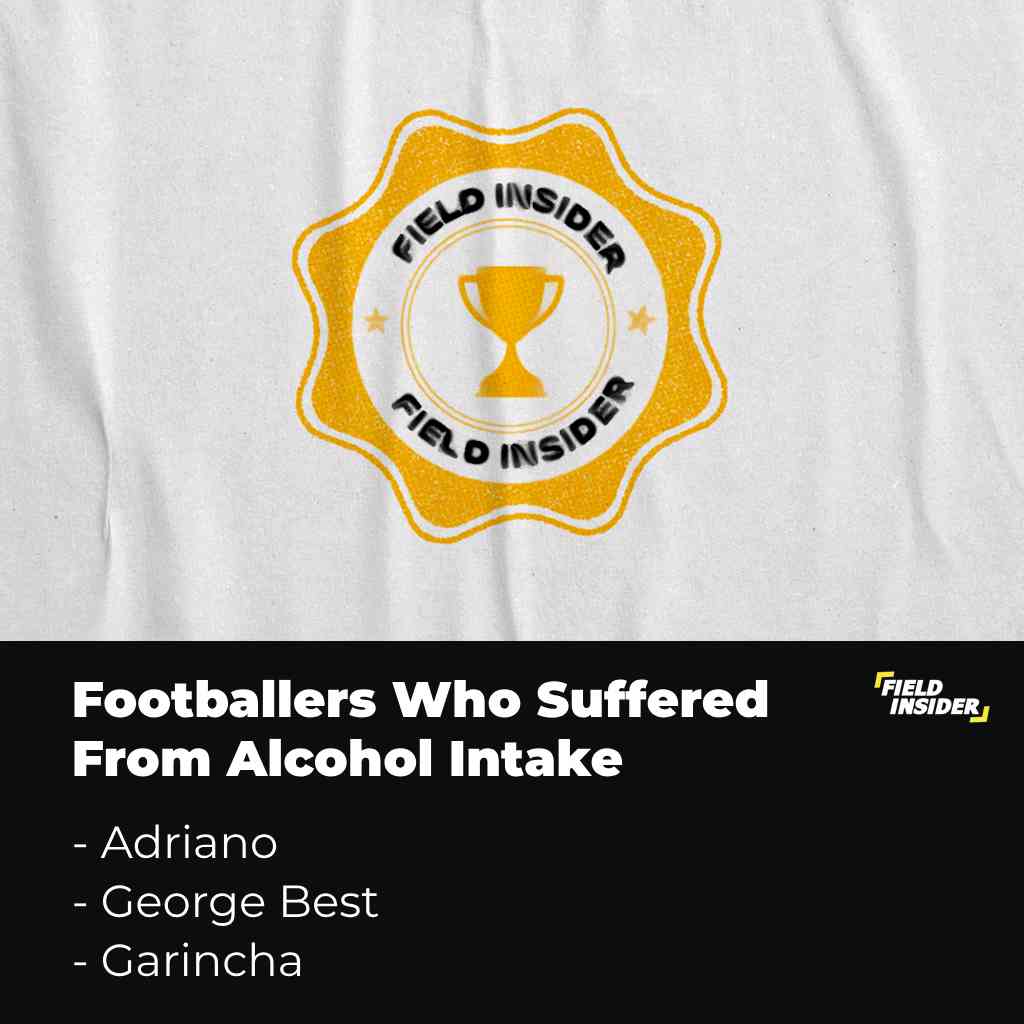
Some professional players have struggled with alcohol during their playing careers, and this has had some negative impact on them and their playing careers.
Adriano
An amazing talent who was on the verge of becoming the best player in the world at one time. Adriano Leite Ribeiro, simply known as Adriano, had an issue with weight and alcohol abuse while playing for Inter.
Unfortunately, in 2004, Adriano’s father died, which led him into depression and drinking.
His then club, Inter, later sent him closer to home, on loan to Sao Paulo to perhaps aid his recovery. This was all in vain however, as we never saw the peak version of Adriano again after that move.
George Best
Regarded as one of the greatest players ever, George Best is a Manchester United legend who was renowned for his silky-smooth dribbling.
Throughout his adult life, Best had issues with alcohol, and if he had maybe a different life, most probably he would be in the conversation as the greatest player ever. All was not lost though, the North-Irish legend had recently placed fifth in the FIFA Player of the Century vote.
“In 1969 I gave up women and alcohol… it was the worst 20 minutes of my life.”
George Best
Unfortunately, he died in 2005 due to a kidney infection caused by alcohol and heavy drinking.
Garincha
Described as one of the greatest players and dribblers ever, Garincha was a main man for Brazil in the 1962 World Cup.
When Pele got injured, Garincha led Brazil to World Cup glory, becoming the first player ever to win the Golden Ball, the Golden Boot, and the World Cup in the same tournament.
While Pele at the time was a role model as a professional, Garincha was spending his time drinking until he passed out.
His alcohol abuse continued after his career which led him to his death in 1983 when he fell into an alcohol coma due to cirrhosis of the liver.
Tony Adams
“Mr. Arsenal”, Tony Adams, spent his entire 19-year career playing at center-back for the Gunners. In order to honor his loyalty and service, a statue honoring Adams was revealed in 2011 at Emirates Stadium.
Despite his success, Tony Adams infamously battled alcoholism throughout his career, which often led him to locker-room and nightclub tussles.
Thankfully, Adams got sober in 1996 after spending time in prison due to a car accident. Today, he is now one of the most high-profile recovering alcoholics in the UK.
Paul Gascoigne
Gazza, a widely known nickname for Gascoigne, earned a reputation as the most naturally talented English footballer of his generation. The English legend represented the national team 57 times, scoring 10 goals for The Three Lions.
In the background, away from flashlights, Gazza had an alcohol issue, whereas he said he would drink four bottles of whiskey per day.
Unfortunately, to this day, Gascoigne is on and off alcohol and still battles his addiction. Hopefully, one day we will be able to see old Gazza smiling and off alcohol once and for all.
Conclusion
Alcohol intake in football typically hinders player performance and overall health more than it contributes positively.
Therefore, it’s crucial for footballers to moderate their alcohol consumption, particularly avoiding it near match times.
Additionally, aspiring young footballers should consider abstaining from alcohol to safeguard their potential and athletic prospects.


